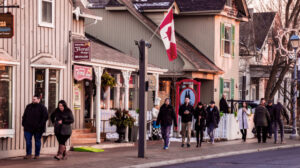Every summer for the past 25 years, Rosalie Cote and her parents have gone to Maine, in the northeastern United States. But for this Canadian family, vacationing there is now a thing of the past.
The neighbouring country was the top destination for Canadian tourists in 2024, with 20.4 million visits, according to the US Travel Association. However, in 2025, those numbers are expected to be very different as many Canadians cancel their stays south of the border, angered by Donald Trump’s policies and attacks on their country.
At this juncture, “we don’t want to support the United States. It’s a matter of principle,” says Forest Service engineer Rosalie Cote.
In the same vein, Roman Govro canceled her mountain-biking trip to Vermont and her family trip to Maine. “We don’t want to go to a place where democracy is in danger, where people are suffering great injustices, and where people are being driven out,” the young student told the Agence France-Presse.
According to an Abacus Data poll, 56 per cent of Canadians have cancelled their travel plans to the U.S. in recent weeks or changed their destination. A trend that translates to a 40% drop in bookings to U.S. destinations in February compared to the same month last year and a 20% cancellation rate on pre-existing bookings, according to travel service Flight Centre Canada.
In the long run, this will impact the U.S. economy, as Canadians represent a $20.5 billion market that supports 140,000 American jobs.
For some Canadians, this goes far beyond cancelling a trip to the U.S.
It’s been 22 years since André Laurent has spent six months each year in Florida to avoid Canada’s winter. He is among the one million Canadians who typically winter in warm climates, including more than 250,000 Quebecers who spend much of the year in the southern U.S. states.
But for him, too, everything changed with Donald Trump’s return to the White House. Speaking of an “uncomfortable” climate following the Republican president’s election in November, the retired civil servant decided to draw a line under his life in the US and sold the property he owned.
“I no longer feel welcome, and I would also have the impression that I was betraying my country,” he explains.
Five out of six Canadians living in his gated neighbourhood have also decided to leave the US permanently.
After Trump announced the imposition of tariffs on many Canadian products, Justin Trudeau, who was still prime minister at the time, urged Canadians to stay in their country. “Why not reconsider our plans for the upcoming summer holidays and finally stay here in Canada? You’ll be able to explore the many national and provincial parks, historic sites, and tourist destinations that our great country has to offer.”
In this climate, social media henceforth has been full of “Choose Canada” videos praising Canadian tourist sites such as the Rocky Mountains in the western part of the country or the islands on the east coast, both presented as ideal Plan B.
And some travel agencies are adopting this trend. At Nuance du Monde, they no longer offer trips to the United States outright. “We are boycotting them given the situation, because the impact of tourism is quite important for Americans,” explains Sami Hamantas, the agency’s director.
Travel agencies are already noting a shift in Canadians booking to destinations such as Europe, the Caribbean, Central America, and Canada, rather than the United States.
After noticing a decline in demand for U.S. destinations, Canadian Flair Airlines changed some of its routes to the U.S. and instead strengthened routes to Mexico, Jamaica, and the Dominican Republic.
“These decisions are based on market supply and demand,” clarifies Kim Bowie, Flair Airlines’ communications director.
Tourism professor Michel Arshabo sees this as a predictable situation. “Domestic tourism will undoubtedly record numbers this year,” he explains to Agence France-Presse. According to a poll by Léger, six out of ten Canadians plan to stay in Canada for their holidays.
This boycott of Canadians is a “special” case in recent tourism history, according to Michel Arsabot. For Rosalie Cote, one is the motto: “We should spend money in our own country rather than on neighbours who are hitting us below the waist.”
Ask me anything
Explore related questions





